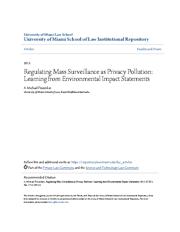A copy of this work was available on the public web and has been preserved in the Wayback Machine. The capture dates from 2019; you can also visit the original URL.
The file type is application/pdf.
Regulating Mass Surveillance as Privacy Pollution: Learning from Environmental Impact Statements
2014
Social Science Research Network
ticularly grateful to Steven E. Koonin for sharing his slides from his stimulatingand, frankly, terrifyingtalk about CUSP at the Simons Foundation in March, 2013 which inspired this article, and also for providing additional information about CUSP's plans and for commenting on an early draft. All remaining errors are entirely my own. I should disclose that I serve on the Advisory Boards of two organizations mentioned in this article: the Electronic Frontier Foundation and the Electronic Privacy
doi:10.2139/ssrn.2400736
fatcat:5hpcg2ush5a45emfwkgtodnini

